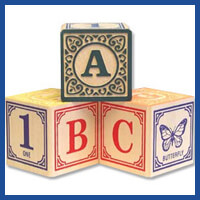FAQ Friday: Why does my child forget spelling lessons so quickly?
Written by Sandie Barrie Blackley, Speech-Language Pathologist
Published on October 19, 2012

A child’s struggle to read, write and spell can be baffling and frustrating — to both child and parents. There may be inexplicable highs and lows. For example, parents frequently tell me that their child makes 100% on spelling tests but two weeks later the child has forgotten how to spell most of the words.
What this suggests is that the child is memorizing the words as letter strings rather than linking the sound structure of the word to the letter symbols in a rational way.
But isn’t that how we learn to spell — by memorizing? A lot of what we “know” about the structure of English words is unconscious. Perhaps we’re aware of a few rules (i before e, etc.), but don’t know that there’s an overarching structure to English spelling. As we learn language, the unspoken rules of spelling assert themselves like a sort of internal file cabinet and we drop words into mental files without much thought. As we memorize new words, including some annoying exceptions to the rules, they find their way into the proper file and our vocabulary grows.
Connect with a Dyslexia Teletherapist for a Free Consultation
But for many children, and in particular, those with dyslexia and other language-processing disorders, memorizing simply doesn’t work. A word might stick around long enough to get the child through a spelling test, but, because the child has no understanding of the word’s internal structure, the word will quickly fade and soon look as unfamiliar as it did on first viewing.
English spelling, as the folks at Real Spelling explain, is “elegantly coherent and predictable.” When a child has difficulty learning and remembering words, the solution is in making words unforgettable by revealing and making explicit the rules that guide spelling. Once a child learns the predictable patterns and logic of spelling, through a system of shared inquiry (asking, exploring, brainstorming, discovering the logic), any new word can be “taken apart” and “put back together” to see how it complies with the rules. Instead of memorized, spelling is truly learned.
English word structure is very regular and when it isn’t regular, there is usually a good explanation for why. This is Lexercise’s approach to spelling. This is how we teach spelling in therapy, including our online dyslexia treatment. Lexercise games, such as Isolator, provide practice that supports learning to spell using a word inquiry approach.
To learn more about this approach to spelling, you are invited to view these Lexercise Live Broadcasts: Gina Cooke, Pete Bowers and Real Spelling. You may also wish to try the Lexercise Screener, a fast, free, online test to see if your child might have a problem with the accuracy and speed of decoding single words. If your child is challenged by spelling, Lexercise can help. Take a look at our Online Dyslexia Testing and Treatment page or contact us directly at Info@Lexercise.com or 1-919-747-4557.
Improve Your Child’s Reading
Learn more about Lexercise today.
Schedule a FREE
15-minute consultation


